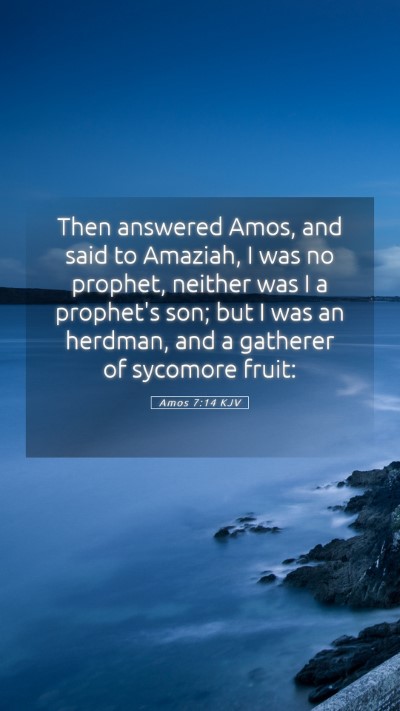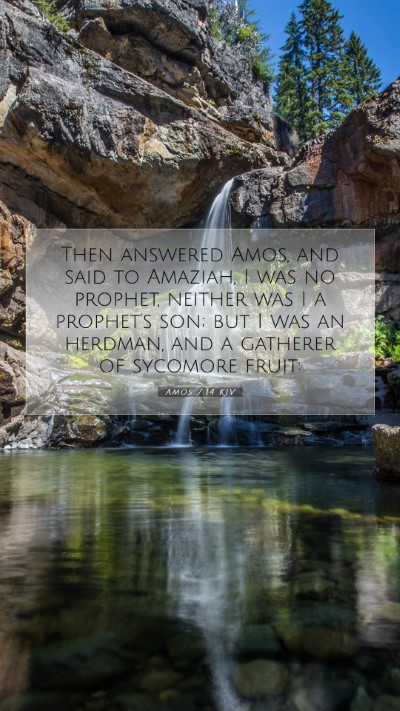Old Testament
Genesis Exodus Leviticus Numbers Deuteronomy Joshua Judges Ruth 1 Samuel 2 Samuel 1 Kings 2 Kings 1 Chronicles 2 Chronicles Ezra Nehemiah Esther Job Psalms Proverbs Ecclesiastes Song of Solomon Isaiah Jeremiah Lamentations Ezekiel Daniel Hosea Joel Amos Obadiah Jonah Micah Nahum Habakkuk Zephaniah Haggai Zechariah MalachiAmos 7:14 Meaning
What is the meaning of Amos 7:14?
Then answered Amos, and said to Amaziah, I was no prophet, neither was I a prophet's son; but I was an herdman, and a gatherer of sycomore fruit:
Amos 7:14 Bible Verse Meaning
Understanding Amos 7:14 - A Commentary
Amos 7:14 presents a significant moment in the prophet Amos's life, where his identity as a messenger of God is underscored. This verse serves as a pivotal text for understanding the intentions of God towards His people, the role of prophets, and the overarching themes of judgment and mercy within the Scriptures.
Verse Analysis:
"Then answered Amos, and said to Amaziah, I was no prophet, neither was I a prophet’s son; but I was an herdman, and a gatherer of sycamore fruit."
Historical Context
To fully appreciate Amos 7:14, we must consider the historical backdrop of Amos's prophetic ministry. Amos, a shepherd by trade, was called by God to prophesy during a time of prosperity and spiritual decay in Israel. The northern kingdom was experiencing social injustice, idolatry, and a disregard for the true worship of Yahweh.
Key Insights from Commentaries
- Matthew Henry: Henry emphasizes that Amos’s declaration of being neither a prophet nor the son of a prophet highlights the divine origin of his calling. This indicates that God can choose anyone, irrespective of their social standing or profession, to deliver His messages. Such a calling serves to illustrate God's sovereignty and the unexpected nature of His servants.
- Albert Barnes: Barnes points out that Amos’s background as a herdman and gatherer of sycamore figs reflects a humble and unassuming nature. His refusal to be labeled within the prophetic tradition underscores the point that true prophets are set apart by God, not by their lineage or profession, thus calling attention to the authentic nature of his prophetic duties.
- Adam Clarke: Clarke adds that the role of Amos as a herdsman demonstrates God's ability to use common people for His profound purposes. This reinforces the idea that God's wisdom often confounds human expectation. Clarke also highlights that Amos's independence from traditional prophetic training marked him as an agent of divine revelation, establishing his authority directly from God.
Thematic Elements
This verse encapsulates several key themes within the text of Amos:
- The Call of God: Amos’s calling outside the traditional prophetic line showcases God’s method of selecting His messengers from various walks of life, emphasizing the nature of divine sovereignty.
- Rejection of False Authority: Amos’s reply serves as a rebuke to those who align with false prophets or place authority in inherited roles rather than divine calling.
- Humility and Service: The nature of Amos's work illustrates a humble approach to service, reflecting the character God desires in His leaders.
Application of the Verse
For modern readers, Amos 7:14 offers several valuable applications:
- Discernment in Leadership: Readers are encouraged to seek out leaders and messages that are grounded in God's truth rather than those who seek validation through traditional or familial connections.
- Embracing Divine Calling: Individuals can find encouragement in knowing that God's calling is not limited to those in clerical positions; anyone can be used by God to fulfill His purposes.
- Value of Humility: The importance of humility in service is pivotal, as God values a contrite heart over outward appearances.
Related Biblical Cross References
- Jeremiah 1:5: God’s calling of prophets before their birth.
- Isaiah 6:8: The willingness of a servant to heed God’s call.
- Luke 3:8: Bearing fruits worthy of repentance, emphasizing the authenticity of one’s witness.
Conclusion
In summary, Amos 7:14 serves as a profound reminder of God's unique calling, the true nature of prophetic ministry, and the humility required to serve effectively in His name. Engaging with the Scriptures through a robust study of verses like this enhances our understanding and application of God’s Word in our daily lives.
For deeper Bible verse explanations and context, engaging in Bible study groups or utilizing various Bible study resources can enhance your Scripture analysis. As you explore the meaning of Bible verses, seek to apply these insights to your life and grow in your understanding of God's messages.


